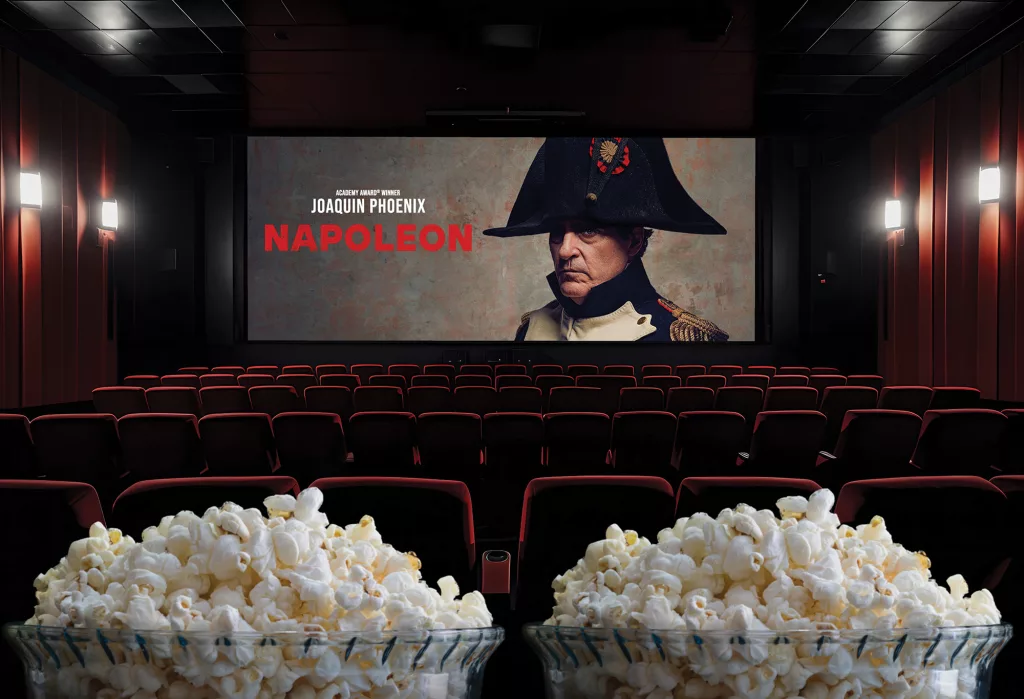Movie Review – Napoleon: Flawed but Fascinating Historical Tribute to an Enigmatic Emperor
Ridley Scott’s Napoleon gets the mood just right, captures all the emotion and torment … but sometimes takes liberties with the truth.
This historical epic directed by Ridley Scott is a masterful depiction of the French emperor’s rise and fall.

Joaquin Phoenix excels in the title role, conveying Bonaparte’s charisma, ambition, and cruelty with nuance and complexity. The film follows his story, from modest beginnings as a Corsican military officer to his rapid rise to power, eventual exile, and death.
Phoenix’s performance is the epic’s heart and soul. With pleasing subtlety, he conveys the emperor’s personality. It’s a challenging role; Phoenix adapted his physique to accommodate Napoleon’s known mannerisms and speech patterns. It’s a portrayal that is both sympathetic and disturbing, revealing the paradoxes that created such a fascinating individual.
Phoenix is well-supported, and Vanessa Kirby, as Josephine, gives an enthralling performance. She communicates the character’s fortitude, perseverance, and devotion, even as their relationship deteriorates. Jodie Comer is outstanding as Napoleon’s sister, Élise Bacciocchi, who was a bright and fiercely independent woman, as devoted to her brother as Josephine.
“The acting, camerawork, lighting, and colour capture the essence of Napoleon Bonaparte — and that of Josephine, the love of his life.”
The marriage is a turbulent one, defined by passion and conflict. The couple’s bond is electrifying from the start, fired by mutual admiration and a shared sense of ambition. Napoleon is charmed by her beauty and refinement, while Josephine is captivated by his magnetism. Their marriage, initially a political arrangement, soon transforms into a true love affair.
An affair riddled with tension and insecurity, though. Napoleon’s unquenchable ambition and unrelenting quest of power detract from his personal life, leaving Josephine feeling neglected. Her socialite status — and Napoleon’s inability to sire an heir — put further strain on things.
Love persists; even when the emperor explores other relationships, he remains emotionally committed. Josephine reciprocates with love and support, even when her partner’s actions cause her pain.
The relationship could be seen as a microcosm of the French Revolution and the Napoleonic Wars, times of enormous upheaval and change. The couple’s relationship progresses from love to a complex and difficult alliance.
The tale is ultimately a tragic one. Napoleon annuls the marriage due to concerns about that missing heir, and a need for stability. Josephine dies heartbroken. Despite this finale, the sense of romance endures. This is a story about passion, ambition, treachery, and undying love.
Scott’s direction is superb, with magnificent battle scenes and grand panoramas. The set design is exquisite, and the costumes are beautiful. While Napoleon is visually gorgeous and emotionally moving, it takes some artistic licence with historical facts.
Although cinematic cannonballs are fired at the Egyptian pyramids, there is no proof that such an attack took place. In another lapse, Napoleon is shown witnessing Marie Antoinette’s execution in 1793. He was stationed in Toulon at the time — and did not arrive in Paris until after the event. In Scott’s account, Napoleon and the Duke of Wellington met in person — but their sole meeting was at the Battle of Waterloo, and they didn’t meet face-to-face. The cinematic Napoleon is visibly younger than Josephine, but the real age difference between them was just six years. The idea that he came from a modest background is also misleading; his family came from Corsican nobility.
But the emperor’s military operations are creatively and faithfully depicted. The chaos and horror of conflict are plain to see. The filmic wars feature a huge cast of extras (some of them CGI, no doubt), and Napoleon’s army’s tactics and methods are well represented. There is no skimping on the violence and brutality of war.
Some of the conflicts are shown as more exciting and frightening than they may actually have been. Napoleon’s personal experiences on the battlefield sometimes eclipse the larger backdrop of the conflicts in which they took place. But who cares? At its heart, this film is a celebration of an emotional, if often frightening, marriage. Josephine’s name is never far from Napoleon’s lips.
Martin Phipps’ musical soundtrack is melancholy but evocative, and perfectly matches the generally gloomy tone of the epic. The soundscape combines symphonic elements and Corsican folk music — and makes good use of silence. Phipps avoids orchestral flourishes and sticks to his restrained and subtle style. This generates a sense of intimacy, allowing the viewer to interact with the emotional heart of the picture. The music perfectly underscores the grim events, and the resulting ambiance of gloom. It’s haunting and moving, and will linger after the final credits have rolled.
The photography is also superb, capturing the sweeping grandeur of Napoleonic France as well as an intimate and emotional portrayal of the emperor. Polish born cinematographer Dariusz Wolski deploys a range of techniques, such as wide vistas and extended takes, to convey that sense of grandeur. There is no shortage of intimate and personal moments. Close-ups and handheld camerawork bring us closer to Napoleon, allowing us to almost feel his emotions and sense his flaws.
Lighting is effectively handled, with dramatic contrasts of light and shade. Wolski uses a subdued colour palette that reflects the grim tone — and the national mood of Napoleonic France. Napoleon is framed in a way that accentuates his solitude and loneliness, while emphasising his power and authority.
Overall, this is an outstanding accomplishment that propels the art of film to new heights. The acting, camerawork, lighting, and colour capture the essence of Napoleon Bonaparte — and that of Josephine, the love of his life.
You may have an interest in also reading…
Leyla Aliyev, Heydar Aliyev Foundation: Azerbaijan’s Can-Do First Daughter
As Donald Trump moved into the White House, reluctantly swapping his gold-clad luxury pad in New York for the relatively
Luxury Living: Music Delivered the Old-Fashioned Way
The news of its death was greatly exaggerated. Sales of vinyl records are spinning through the roof. According to Nielsen
Q&A Bentley Motors’ Stephen Reynolds: Unchanged Core Values Drive Bentley’s Global Expansion
How does Bentley secure continuous innovation and technological improvement? With the launch of new models in the coming years, the

















































































